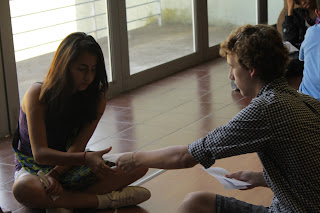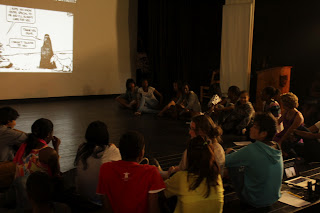Global Concerns: Discrimination
Welcome! This blog is made by Waterford Kamhlaba UWC and UWC Red Cross Nordic as a product of the two simultaneous conferences on discrimination that our schools will be having on March 21st.
The conferences focus on four topics: Religion, disabilities, ethnic minorities and women's rights. On the day, participants from all over the world will produce articles and other material to be shared between our schools on this blog. Click here to view the program.
Wednesday, March 28, 2012
Applying for Asylum
In the borders all over the world, refugees flee their homes hoping to discover whether the grass is truly greener on the other side. The process of applying for asylum is becoming more and more difficult. Things like xenophobia, racism limit the acceptance of these refugees in their host countries.
In our workshop, we worked with the junior students and delivered for them an active workshop that placed them in the shoes of the countless refugees who cross borders every minute of every day every year. We begun with application forms written in Creole and Spanish a language few students understood and in their frustrations of trying to figure out what the form required of them they experienced the many frustrations refugees experience.
We also in the same workshop, discussed the ethnic discrimination that all bombers are Asian especially Arabs. We asked them to try justify a situation where they were to torture a suspect to save various lives...
The discussions got the students to think of their personal opinions on the topic of Ethnic minorities. Above are pictures of this workshop..
World Wide Women
The students part of the community service that deals with women rights holding a workshop to discuss the different discrimination women face around the Globe
Friday, March 23, 2012
Disabilities, cultural sharing & solutions
In the workshop we started with a country profile before the actual workshop, so the participants could se their way of thinking of disabilities before and after. In the workshop the participants discussed in smaller groups:
What is a disability in your culture?
We gave them the opportunity to try writing down the definitions, with surprising result. The participants tended to write too specific definitions. We showed the World Health Organizations definitions so they could compare and see where they lacked. Generally, the participants saw that they needed to be broader. Ultimately, they wrote new definitions and came up with a very simple version, being abnormal.
We ended the workshop by looking at the question; is impairment your lack of ability to execute a task, or societies lack of adjustment so you can execute a task? The question was heavily discussed, and all the groups cam up with a general answer: directly it is your disability that is making you impaired, but since being abnormal is part of the definition, the society sets the standards, and then they also disable you. They also felt it was the society’s responsibility to also do certain adjustments since the disabled also are adjusting.
Fredrik & Bernadette - RCNUWC
- Are everybody disabled?
- Define disabilities, both physical & mental.
- Is impairment your lack of ability to execute a task, or societies lack of adjustment so you can execute a task?
We gave them the opportunity to try writing down the definitions, with surprising result. The participants tended to write too specific definitions. We showed the World Health Organizations definitions so they could compare and see where they lacked. Generally, the participants saw that they needed to be broader. Ultimately, they wrote new definitions and came up with a very simple version, being abnormal.
We ended the workshop by looking at the question; is impairment your lack of ability to execute a task, or societies lack of adjustment so you can execute a task? The question was heavily discussed, and all the groups cam up with a general answer: directly it is your disability that is making you impaired, but since being abnormal is part of the definition, the society sets the standards, and then they also disable you. They also felt it was the society’s responsibility to also do certain adjustments since the disabled also are adjusting.
Fredrik & Bernadette - RCNUWC
Wednesday, March 21, 2012
Minorities in China: Tibet
The presentation was held by a Chinese and a Tibetan student at RCNUWC.
Movie about Living with HIV/AIDS
This short movie was made by the Joint United Nations Program on HIV & AIDS and used by the living with HIV/AIDS workshop:
They see me rollin' they hatin'
Almost 1 in 7 people has some limits to mobility.
Apart from this, last week was perception week at RCN with more workshops on visual impairments and a lot of students challenged themselves and tried going 'blind' for a day.
Following was a presentation of different physical disabilities as well as the Norwegian law that everyone should have an equal accessibility to facilities.
The workshop ended with a small quiz on the newly gained knowledge and a presentation from a disabled RCN student, telling about his experiences here. See this presentation here.
See other videos from the workshop here.
Points from the discussion on accessability for disabled students at RCN
- Points raised:
- Smart Boards are good but we need more
- Electronic doors need more and more education on how to use them. Why do they break? When do they break?
- Students are open minded and helpful
- Not all building are accessible ex: DH Cantina Students houses , second floors, k building
- Education on how to help, what to do, terminology, Information on specific cases
- Information about and from students and staff with disabilities
- Teachers should put more effort into supporting students
- School should accept more people with disabilities but only if they have enough facilities.
- Snow shoveling should be handled better and by more people
- Does the school follow Norwegian law? Does the school receive money from the govt to make things accessible? And if so where is the money going?
- More Info about laws and money
- Pathways ( Student village to cantina, silent house, boat house are NOT accessible)
- Suggestions for improvement:
- Signs to remind and explain about doors
- Salt instead of Gravel or alternative to gravel if salt is bad
- Bathroom in K build
- Accessibility to K2
- Take shoes of by door of houses, to remove shoes from corridors this also makes house cleaner and drier
- More light around campus
- An EAC focused on helping disabled students
- Permanent help to all who need it
- People should be hired to do the work that “volunteers” do now.
- Why aren’t there more volunteers? Advertiser
- Basic Training on disabilities for all students and staff (How, what, why ,when)
- Student Council
- Presentation in college meeting
- General Attitude amongst students and staff not just physical aid
- Elevators
- Ramps
Subscribe to:
Comments (Atom)






















